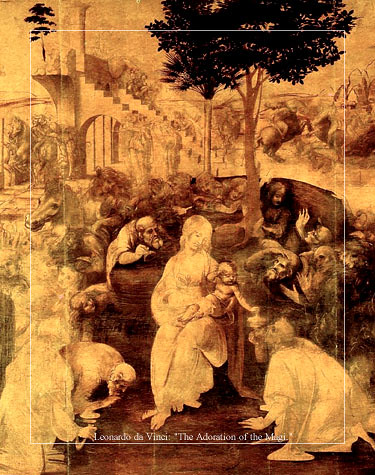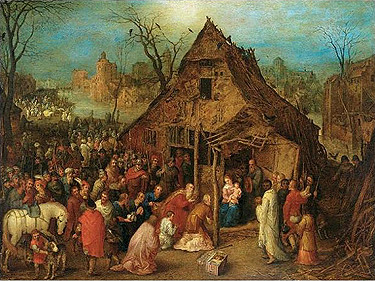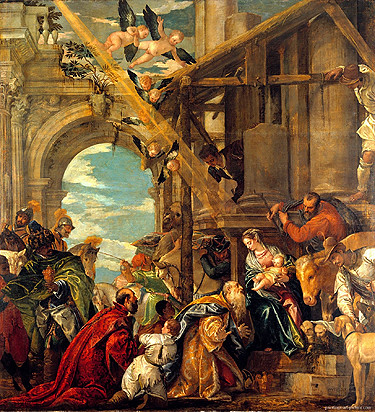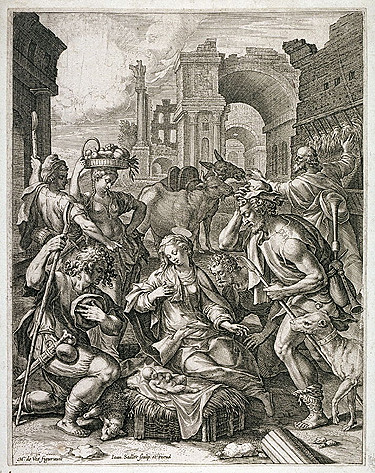
Volume XVI, Issue Ie
Apprehending the Transcendent
Roger Scruton and Jordan Peterson
Epiphany, Another Forgotten Season
Celebrated by the Western Church on January 6th, Epiphany celebrates the revelation of Christ to the Nations, as pictured by the visitation of the Magi. Portrayed as three Eastern kings astride camels, they follow the Christmas star to worship the newborn King. Here is a profound telling of truth that is often lost in its cultural wrappings. If ever there was a celebration needed for today, it is Epiphany!
The biblical identification for these pilgrims is Magi. The Magi are an interesting group in temselves, originating in a hereditary priesthood of the Medes (the ancestors of modern day Kurds). They were installed as religious leaders and policy advisors to the Persian court by Darius and here they actually make their first appearance in Holy Writ. Daniel, carried into exile from the fallen kingdom of Judea, is assigned to this group when he surpasses the rest of them in his service to the king. Daniel correctly fortold the return of the exiles seventy years in the future.
Though he served a secular king and kingdom, Daniel never lost his connection to G-d and Jerusalem. His quarters had a window facing Jerusalem and he was 'busted' for praying when the king decreed that all his citizens bow only to him. Daniel's deliverance from this decree's punishment, by a Divine intervention, is an often told story by people of Faith. What must be conjectured, however, is the influence this man of Faith might have had on his fellow wizards.
Daniel never returned to Jerusalem, though he never forgot her. He grew old and died as a stranger in a strange land. Though he walked the halls of power in Persia, his citizenship remained in the Land of Promise. His book ends with descriptions of things far into the future, and is silent about the later life of Daniel himself. One might safely assume that he remained in the company of the Magi and continued to serve the Persian court.
A young spiritually minded person would have sought out men like Daniel as mentors. Thus it is highly likely that the hope of the coming King was wrapped into the fabric of Daniel's life and work in such a way that his apprentices would preserve it. Many years later it propelled some of them on a long and perilous journey to find that King. There is no Scriptural reference saying there were only three. That may be an assumption based on the mention of three specific gifts they brought; Gold Frankincense and Myrr.
And what did they find? A Child and his mother, ordinary in their appearance perhaps, but marked by Heavenly purpose! Picture the scene, if you will, of mighty clerics, who direct the affairs of empire by their counsel bowing before a woman and an infant!
Epiphany compels us to wrap our minds and hearts around ancient truth and promise. Epiphany compels us to fight the myopia of contemporary culture and look for the Hand of the Divine! Epiphany compels us to awaken from our slumber and if we hear the voice of G-d, to LISTEN! Epiphany is that discovery so wonderful it is a sin to conceal it. It is a truth that carries a blessing for ALL who will hear it and heed it.
So, as the world around us marks the beginning of a new year and marks down the merchandise of Christmas past, it is really time to continue unwrapping the wonder of G-d's redemptive relationship with His children. Old truths must be pondered, but the promise we find there demands action. The voice of G-d must be answered. History, you see, is not some endless cycle. It leads us on a journey to find a specific destination. The voice of the Divine speaks of far more than some warm feeling of self-actualization. It calls us to participate in the ushering in of a Greater Kingdom!
C. S. Lewis captured the hope and the message so well in this thought from "The Lion, the Witch and the Wardrobe:"
When Adam’s flesh and Adam’s bone,
Sit at Cair Paravel in throne,
The evil time will be over and done."
Spoken to four rather ordinary children, the extaordinary hope of Aslan's rule creates a feeling of thrilled anticipation. Does the knowledge of the unfulfilled prophecies of G-d's Eternal Kingdom create in us today that feeling as well?
Epiphany's Meaning for Today
Around the world, the hope of Christ's Eternal Kingdom fires the passion of Christians in diverse and difficult situations. Coptic Christians in Egypt share this hope with hidden house church groups in China and North Korea. In Nigeria the faithful watch their churches destroyed, knowing that an Eternal Jerusalem awaits them.
Twelve men hiding in an upper room were propelled outward one Pentecost long ago to share that hope. These reluctant witnesses found themselves empowered by the Holy Spirit as they went. At first glance, history seems to tell us that the church eventually divided into many factions... today many at the tips of these branches hold tight to their distinctives, but miss the branching and rooting of a great tree. Today there are many distinctive groups within Christianity, but the essential message has survived. Essential truth has indeed flowed like the lifeblood of this great tree.

Adoration of the Magi, (1600) Jan Brueghel the Elder.
The Epiphany, It is Important
The traditional celebration of Christmas lasts for twelve days. It begins on Christmas Day with the celebration of the birth of the Redeemer and ends on Epiphany, which celebrates Christ's revelation to the gentiles. The MAGI, or the Wise Men came from Persia seeking a prophesied King. It is very likely that these were men who had studied the writings of Daniel and now saw the signs of the fulfillment of things he had written: "And the kingdom and dominion, and the greatness of the kingdom under the whole heaven, shall be given to the people of the saints of the most High, whose kingdom is an everlasting kingdom, and all dominions shall serve and obey him." -- Daniel 7: 27
The revelation of Christ to the Gentiles also fulfills a promise made to Abraham: "By myself have I sworn, saith the Lord, for because thou hast done this thing, and hast not withheld thy son, thine only son:
That in blessing I will bless thee, and in multiplying I will multiply thy seed as the stars of the heaven, and as the sand which is upon the sea shore; and thy seed shall possess the gate of his enemies;
And in thy seed shall all the nations of the earth be blessed; because thou hast obeyed my voice." -- Genesis 22:16-18

Paolo Veronese (1528 - 1588)
Nativity, Epiphany and Baptism
[click to read]
Over the last few weeks we’ve celebrated three great feasts of the Church; namely the Nativity of Our Lord Jesus Christ, the Epiphany and the Baptism of Christ. These are three great feasts of the revelation of God to man in Christ Jesus and to begin to understand something of their message we must first look at their evolution.
It’s a little known fact that these three great feasts celebrated on the 25th of December, the 6th of January and the first Sunday after the 6th of January (or if you are in England, the 25th of December, a movable Sunday between the 2nd and 8th of January and the first Sunday after the Epiphany unless the Epiphany falls on the 7th or 8th in which case the Baptism of the Lord, as it was this year, is bumped to a Monday: Sometimes being English is more complicated than it’s worth!) were originally all celebrated on the 6th of January, an ancient date first mentioned in the 4th century but very likely to have been celebrated much earlier than this.
The original feast was hugely rich and celebrated the revelation of the Creator to the creation in Christ Jesus by looking at the birth of Jesus, the adoration of the Magi, the Baptism of Christ and the wedding feast at Cana. In the 4th century the Nativity of Christ was separated from these other remembrances of the incarnation by the Church of Rome and commemorated on another day, the 25th of December. This Roman feast quickly spread throughout Christendom and so we found ourselves with two celebrations of God’s revelation in Christ. Over time in the West, the feast of the Epiphany became an emphasis of the Adoration of the Magi over and above a celebration of the Baptism of the Lord. The East still retains the feast of the Epiphany, or Theophany as it is commonly called in the East, as primarily a celebration of the Baptism of the Lord. In 1955 the Roman Church, noting the change in emphasis of the feast of the Epiphany, again instituted a new feast for the Baptism of the Lord – originally on the 13th of January but quickly moved to the Sunday after Epiphany (unless you’re English!).
So we have three feasts in the West all celebrating separate aspects of the same event; a truly rich liturgical heritage and a whole season of the Church (Christmastide) with the Baptism of the Lord as the pivotal feast moving us from Christmas to Ordinary Time. We’ve already seen that these three feasts spring from one feast of the Incarnation, of God’s revelation to mankind, but what are the three separate aspects of that event commemorated on these three days? (read more)

Jan Sadeler.
The Roots of Christmas
[click to read]
The assertion that Christmas is merely a “Christianized” pagan holiday simply isn't true.
In his book "The Origins of the Liturgical Year," Thomas Talley shows that Dec. 25 was celebrated in the early church by the third century and suggests a North African rather than Roman origin for the feast and its dating.
There were both theological and historical principles at work in arriving at that date. The process began by seeking to establish the likely historical date for the death of Jesus at Passover. This was thought to have been March 25. The annunciation was set to correspond with that date, so that, theologically, the conception of Jesus and the death of Jesus are observed as part of the same whole. The date to observe the birth of Jesus was then set by adding nine months to March 25, thus arriving at Dec. 25.
This process for historical and theological dating was already in place in some of the churches in North Africa as early as the late second century and appears to have spread across the churches from there. (read more) h/t J. Greer
